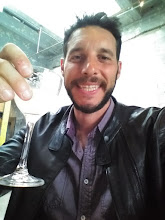Looking over the ledge of the building, the two men witness a sea of motley colored suits spill into an incandescent Freemont Street. The men are holding up traffic and searching everywhere, including neighboring casinos, for the pair. They question pedestrians in the urgent manner of pulling at their lapels, while shoving others aside as they stride down the sidewalk in measured leaps.
The driver struggles for his breath. “Shit man! Wad’ju pull?!”
The hitchhiker smirks like a mischievous child and holds the bushel of money out in front of him.
“Ya tryin ta get us killed?!” The driver is not impressed by the hastily gathered sum. “Shit, we gotta get outta here.” He said “we” though he would gladly offer up his passenger if it would mean his safe escape. The driver can’t follow this train of thought any further. He busies himself with trying to gain his bearings. He peers over each adjacent side, then the rear.
From this height, the rest of Las Vegas spreads out before them. It’s a sight that would otherwise be worth stopping for and drinking in, if they had the luxury of doing so.
Behind the casino, there is not so much an official parking lot as a barren, unsecured site on which the next grand casino is to be built. It sits a little bit off the main strip and is most easily accessible by a one-car wide alley that backs the casinos running north along Freemont. The driver, through a fog of labored breathing and alcohol fumes, remembers the silent walk from the car back to the main strip, and then down to the casino’s front doors. He tries to trace it in reverse, all the while estimating if it was a long, or not so long, walk. All he can remember is being so eager to lose the hitchhiker once inside, or at least once settled at a table, that the time between each step seemed like an interminable instant.
When looking back at the what-ifs and if-onlys, we unfairly glimpse a life that has no right to be reexamined. The driver recalls the procession through the back alley, with its many divergences, and onto the main street, with its numerous casinos and shops into which he could have escaped. He thinks of how he was free the entire time to go anywhere, duck into a doorway, or even batter the hitchhiker over the head with the handle of his gun; or worse, if it came to it. Yet these choices never presented themselves as clearly as the path from his car to El Dorado’s door.
Call it the path of least resistance: the impossibility of foreknowledge combined with the very human prejudice of continually assuming a favorable, or at least non-disastrous, outcome. The driver’s situation on the roof of a hotel, one hundred and thirty feet in the air and searching for a way to get down to his car, starts to not only make sense, but seems like the logical outcome of everything to have come before.
But the driver cannot see it this way. He is wrapped up in an immediate future of spur-of-the-moment risk calculations and the types of trade-offs that people can never ultimately live with. The past, however much it got him to this point, will not get him off this roof; nor will brooding over what he could have done. What matters is what he will do next, if only he could calm down for a minute to think.
The driver comes to lean against the edge as if he’s going to vomit. Nothing comes but the hot fumes of cigar smoke and a sickly alcoholic sting in his throat. Meanwhile, the hitchhiker has found a fire escape and is hoisting one leg over at a time.


0 Comments:
Post a Comment
<< Home